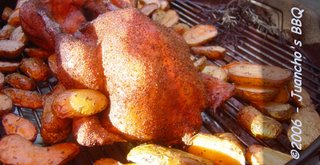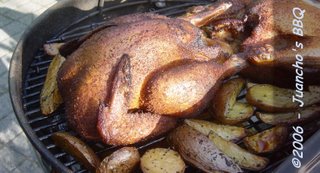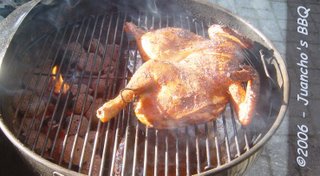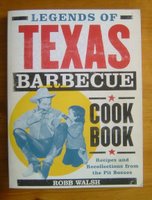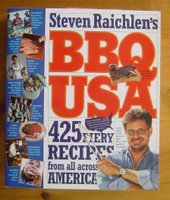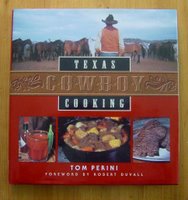Join Juancho on his backyard BBQ adventures and discover a safe, sure and easy way to barbecue with optimum results - It's relaxing, it's fun, and it's absolutely delicious!!!
In Surinam this pork roast is called Losie Agoe Mètie. My good friend Edgar traditionally makes it on Christmas Eve. The recipe probably finds its origin in the Chinese community in Paramaribo. Ed usually takes a fair piece of porkside, but you could use any cut of pork meat, or even the whole hog.
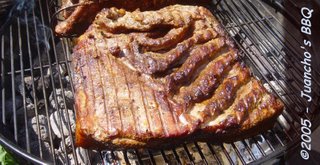
This is how I make a Paramaribo Pork Roast on my Weber kettle grill. The overall principles should remain the same if you use a different make of grill, as long as it is a closed grill and you set it up for indirect grilling.
The meat:
- 5 to 7 pounds of fresh porkside or boston butt
For the marinade:
- 1½ cup sweet soy sauce
- 2 teaspoons ginger powder
- 6 teaspoons Chinese five-spices powder
- 8 cloves of fresh garlic, flattened and finely chopped (or 2 tablespoons of garlicpowder)
Preparations:
Wash the pork and blot dry using paper towels. If you are going to do a porkside with skin on, pierce a whole bunch of holes in the porkskin using a sharp fork. At this point you could consider rubbing some salt in the punctured skin and let dry for a couple of hours in a cool place. This will yield a more crispy skin after roasting.
Mix all ingredients for the marinade and marinate the pork, at least one hour, preferably overnight. For marinating, a zip-lock bag works best.
A word of caution here: when working with raw meat, make sure all work surfaces, utensils and your hands are thoroughly clean before you start, and clean thoroughly immediately after you finish.
Set up your barbecue for indirect grilling. I use a Weber chimney to light about 24-30 pieces charcoal briquettes. Once the briquettes are spread on both sides of the Weber barbeque and glowing well, I add a few lumps of wet apple wood.
In the center of the Weber barbeque I place a dripping pan with about 2 pints of water. For special flavour effects you could replace the water by beer or wine, but I don't believe that a true Surinam man would do something crazy like that.
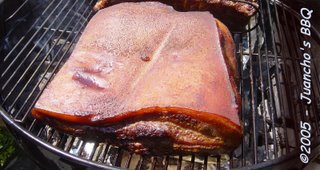
Get Smokin' !
Get the meat out of the marinade and blot dry using paper towels. Don't throw away the remaining marinade.
Put the meat on the grill with the skin or fat upwards.
Close the lid of the Weber and check if the vent holes in the lid and the bottom of the Weber are fully open. Wait a couple of minutes until you see a whisp of blue smoke escaping from the top vent holes. The idea is to slow roast the meat, so the trick is to keep the fire low without killing it. Close the bottom vent holes, then open halfway.
Every ten minutes or so, check if the fire is still going "not too low and not too high". To prevent too much heat loss, try to do this without opening the lid, but when in doubt don't hesitate. Better safe than sorry.
Meanwhile, boil the remaining marinade in a small saucepan. Stir in one tablespoon of honey and use as a basting sauce.
After about one hour of smoking, baste and turn the meat. Use a couple of sturdy thongs, and try not to squeeze the meat too much in order to prevent loss of juices. For the same reason you don't want to use a fork eather.
After about two hours of smoking, baste and turn the meat again. At the same time you add about eight to ten glowing charcoal briquettes to the fire on each side of the Weber grill, and you add some more smoking wood as you please. Be careful not to overdo the smoking, though. Too much smoke will leave a bitter taste on the wood.
If at this point in time you consider the meat brown enough, you may want to cover it loosely with aluminium foil before closing the lid of your Weber.
After about three hours of smoking, baste turn the meat again. Keep the meat loosely wrapped with aluminium foil to prevent it from blackening too much.
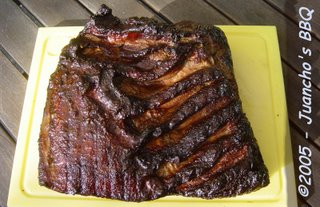
Dinner Time!
After 3 to 4 hours slow roasting the meat should be truly well done. You can check this with a meat thermometer, about 180 degrees F (just over 80 degrees C) is OK. (Even so, like it or not, I always check the doneness of the meat by cutting it open in the middle to check the interior)
Once you are sure the pork meat is well done, baste it one final time and transfer it from the grill to a cutting board or (pre-heated) plate. Leave it covered in aluminium foil for 10 to 15 minutes in order to allow the juices and temperature inside the meat to re-distribute and so obtain a more tender and juicy effect.
Cut the meat in thin slices for serving.
Favourite Combinations:
In Surinam, roasted pork is typically served with white rice, vegetables like "kouseband" and fried platano ("baka bana").
Favourite Drinks:
Cold mineral water with fresh lemon slices, cold beer, cold dry white wine. When served by itself as a snack this pork goes very well with a heavy red wine.
Think about tomorrow, buy an extra large piece of meat and make sure you have left-overs…
Keep smokin' - More to come...
Thanks for reading, leave a comment.
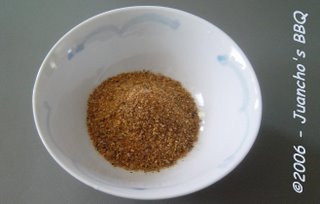
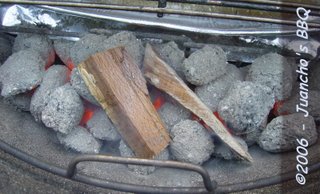
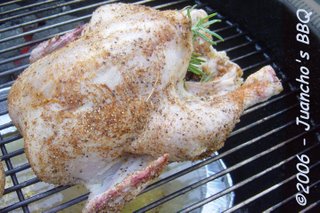

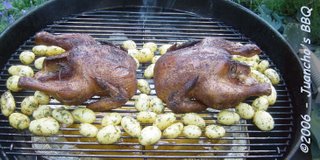
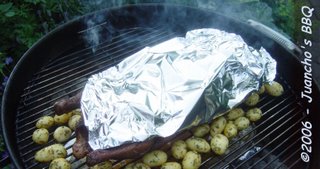

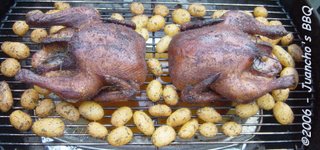
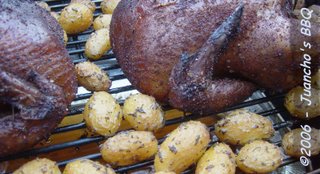



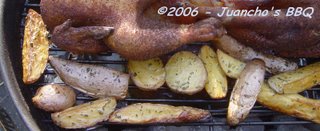
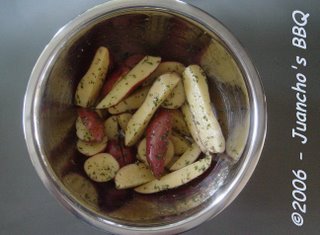
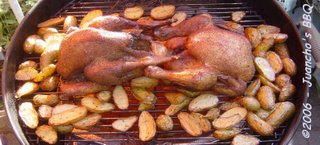 To make sure these 'taters are done, pick one of the thickest wedges and check the inside.
To make sure these 'taters are done, pick one of the thickest wedges and check the inside.